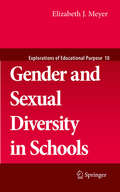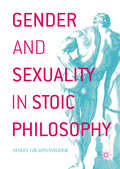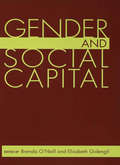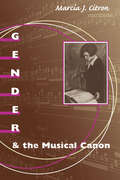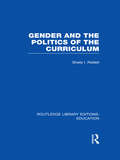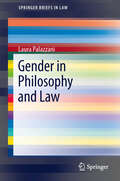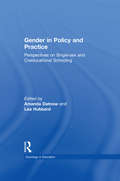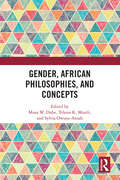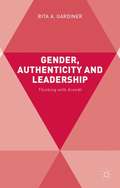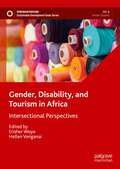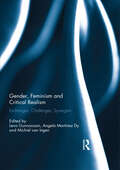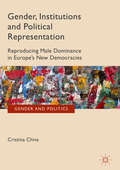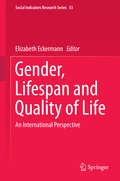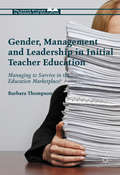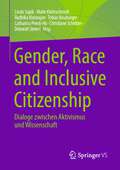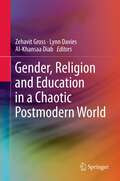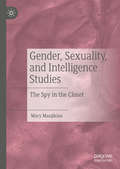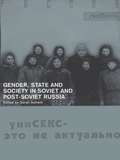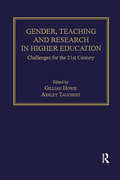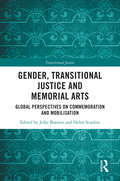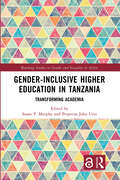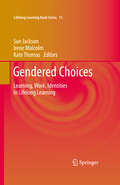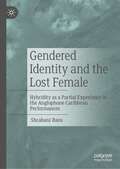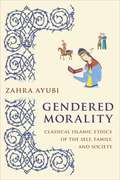- Table View
- List View
Gender and Sexual Diversity in Schools
by Elizabeth J. MeyerIssues related to gender and sexual diversity in schools can generate a lot of controversy, with many educators and youth advocates under-prepared to address these topics in their school communities. This text offers an easy-to-read introduction to the subject, providing readers with definitions and research evidence, as well as the historical context for understanding the roots of bias in schools related to sex, gender, and sexuality. Additionally, the book offers tangible resources and advice on how to create more equitable learning environments. Topics such as working with same-sex parented families in elementary schools; integrating gender and sexual diversity topics into the curriculum; addressing homophobic bullying and sexual harassment; advising gay-straight alliances; and supporting a transgender or gender non-conforming student are addressed. The suggestions offered by this book are based on recent research evidence and legal decisions to help educators handle the various situations professionally and from an ethical and legally defensible perspective.
Gender and Sexuality in Stoic Philosophy
by Malin Grahn-WilderThis book investigates the Ancient Stoic thinkers’ views on gender and sexuality. A detailed scrutiny of metaphysics, ethics and political philosophy reveals that the Stoic philosophers held an exceptionally equal view of men and women’s rational capacities. In its own time, Stoicism was frequently called ‘ the manly school’ of philosophy, but this volume shows that the Stoics would have also transformed many traditional notions of masculinity. Malin Grahn-Wilder compares the earlier philosophies of Plato and Aristotle to show that the Stoic position often stands out within Ancient philosophy as an exceptionally bold defense of women’s possibilities to achieve the highest form of wisdom and happiness. The work argues that the Stoic metaphysical notion of human being is based on strikingly egalitarian premises, and opens new perspectives to Stoic philosophy on the whole.
Gender and Social Capital (Gender Politics--Global Issues)
by Elisabeth Gidengil Brenda O'NeillThe volume brings together a stellar group of contributors who examine the social capital thesis by means of four different approaches: theoretical, historical, comparative, and empirical. In the end, this book will serve to answer two fundamental questions which have hitherto been neglected: What can a gendered analysis tell us about social capital? And what can social capital tell us about women and politics?
Gender and the Musical Canon
by Marcia J. CitronA classic in gender studies in music Marcia J. Citron's comprehensive, balanced work lays a broad foundation for the study of women composers and their music. Drawing on a diverse body of feminist and interdisciplinary theory, Citron shows how the western art canon is not intellectually pure but the result of a complex mixture of attitudes, practices, and interests that often go unacknowledged and unchallenged. Winner of the Pauline Alderman Prize from the International Alliance of Women in Music, Gender and the Musical Canon explores important elements of canon formation, such as notions of creativity, professionalism, and reception. Citron surveys the institutions of power, from performing organizations and the academy to critics and the publishing and recording industries, that affect what goes into the canon and what is kept out. She also documents the nurturing role played by women, including mothers, in cultivating female composers. In a new introduction, she assesses the book's reception by composers and critics, especially the reactions to her controversial reading of Cécile Chaminade's sonata for piano. A key volume in establishing how the concepts and assumptions that form the western art music canon affect female composers and their music, Gender and the Musical Canon also reveals how these dynamics underpin many of the major issues that affect musicology as a discipline.
Gender and the Politics of the Curriculum (Routledge Library Editions: Education)
by Sheila RiddellThis book uses detailed case studies of two secondary schools to examine the relationship between curriculum choice and gender identity among fourteen-year-old pupils making their first choices about what subjects to pursue at exam level. It reveals a two way process. Pupils’ decisions on what subject to take are influenced by how they perceive themselves in gender terms, and the curriculum once chosen reinforces their sense of gender divisions. The author looks at the influences on pupils at this stage in their lives from peers, family and the labour market as well as from teachers. She argues that the belief in freedom of choice and school neutrality espoused by many teachers can become an important factor in the reproduction of gender divisions, and that unless the introduction of the national curriculum is accompanied by systematic efforts to eradicate sexism from the hidden curriculum it will fail in its aim of creating greater equality of educational opportunity among the sexes.
Gender in Philosophy and Law
by Laura PalazzaniThis book is an introductory systematic framework in the complex and interdisciplinary sex/gender debate, focusing on philosophy of law.The volume analyses the different theories that have dealt with the gender category, highlighting the conceptual premises and the arguments of the most influential theories in the debate, which have had repercussions on the field of the ethical and juridical debate (with reference to intersexuality, transsexualism, transgender, homosexuality). The aim is to offer a sort of conceptual orientation in the complexity of the debate, in an effort to identify the various aspects and development processes of the theories, so as to highlight the conceptual elements of the theorisations to grasp the problem areas within them. It is therefore an overall synthetic and also explicative analysis, but not only explicative: the aim is to outline the arguments supporting the different theories and the counter-arguments too, for the purpose of proposing categories to weigh up the elements and to take one's own critical stance, with a methodological style that is neither descriptive nor prescriptive, but critical.
Gender in Policy and Practice: Perspectives on Single Sex and Coeducational Schooling (Sociology in Education)
by Lea Hubbard Amanda DatnowThis book exposes the complexity of single-sex schooling, and sheds new light on how gender operates in policy and practice in education. The essays collected in this volume cover a wide range of institutions, including K-12 and higher education, public and private schools, and schools in the US and beyond. Detailing the educational experiences of both young men and women, this collection examines how schooling shapes-and is shaped by- the social construction of gender in history and in contemporary society.
Gender, African Philosophies, and Concepts
by Musa W. Dube Telesia K. Musili Sylvia Owusu-AnsahThis volume sets out to explore, propose, and generate feminist theories based on African indigenous philosophies and concepts. It investigates specific philosophical and ethical concepts that emerge from African indigenous religions and considers their potential for providing feminist imagination for social justice-oriented earth communities. The contributions examine African indigenous concepts such as Ubuntu, ancestorhood, trickster discourse, Mupo, Akwaaba, Tukumbeng, Eziko, storytelling, and Ngozi . They look to deconstruct oppressive social categories of gender, class, ethnicity, race, colonialism, heteronormativity, and anthropocentricism. The book will be of interest to scholars of religion, philosophy, gender studies, and African studies.
Gender, Authenticity and Leadership: Thinking with Arendt
by Rita A. GardinerThis book examines the conceptual underpinnings of authentic leadership to discover why so little attention has been paid to gender. The author explores the failure to interrogate the complexities surrounding the concept of authenticity, especially as it relates to the diversity of lived experience.
Gender, Disability, and Tourism in Africa: Intersectional Perspectives (Sustainable Development Goals Series)
by Erisher Woyo Hellen VenganaiThis book explores the intersection of gender and disability in the context of tourism. In part, the book foregrounds feminist theorising of intersectionality by examining how gender can overlap with other social identities to contribute to more systemic oppression, domination, discrimination, and marginalisation of certain categories of people. Our point of departure is that disability does not operate in isolation as it is constituted and experienced within an already gendered social and tourism environment. With substantial research on the intersection of gender and tourism on the one hand, and the intersection of disability and tourism on the other hand, the interconnectedness of gender and disability and the implications this has on tourism policy and practice remains understudied. Thus, the book provides a critical lens that helps unpack underlying assumptions about gender and disability while questioning the dominant ideas about gender and disability reproduced through tourism policies and institutional practices in an African context. This book will be of interest to scholars and researchers in Gender Studies, Disability Studies, and Tourism Studies, particularly those with a research interest in Africa.
Gender, Feminism and Critical Realism: Exchanges, Challenges, Synergies
by Lena Gunnarsson Michiel Van Ingen Angela MartinezThis book marks a pivotal moment in the intensifying dialogue between the philosophical approach of critical realism and the fields of feminist theory and gender research. During the last three decades, these fields have been decisively influenced by poststructuralist perspectives. As such perspectives are increasingly being challenged, this book argues that critical realism is able to serve as a fruitful resource for carving out new paths for feminist theorizing and research. At the same time, it argues that feminist insights on gender and knowledge production have the potential to significantly enrich the field of critical realist philosophy as well. Hence, this book serves as a forum for a number of interventions that, in different ways, explore synergetic potentials as well as tensions between critical realist and various feminist perspectives. It engages in debates over the conditions of knowledge production and the relationship of knowledge to the world, offers new ways of understanding sex, gender and power, as well as the intersectional interplay of diverse power relations, and explores how critical realism relates to new materialist and postpositivist realist approaches. This book was originally published as a special issue of the Journal of Critical Realism.
Gender, Institutions and Political Representation
by Cristina ChivaThis book traces the struggles over the institutions of political representation in Central and Eastern Europe, focusing on the factors that have held women back over the post-communist period, as well as on the growing evidence for change throughout the region. Post-communist Europe has long raised two puzzles for scholars of women's representation in politics. First, why have women been under-represented in politics in every country in the region since communism's collapse? Secondly, why are there relatively few cases where women's advocates have been successful in pressing for change? This comparative study of Europe's new democracies argues that these puzzles are best understood as questions about male dominance - that is, about the mechanisms that sustain, or, alternatively, change long-established patterns of male over-representation in politics over time. The author covers six EU member states - Bulgaria, the Czech Republic, Hungary, Poland, Romania and Slovakia - during the period 1990-2016. The book will be of use to students and scholars in the fields of Comparative Politics, Democracy and Democratization, European Studies, Gender Studies, Post-Communist Studies, and Central and Eastern European Studies.
Gender, Lifespan and Quality of Life
by Elizabeth EckermannThis publication addresses the gender dimensions of people's lived experience and emphasizes how gender relationships differentially impact on women's and girls' as well as men's and boys' subjective well-being across the lifespan. It therefore fills a significant gap in the literature on quality of life and subjective well-being. The book brings together research which compares female's and male's subjective experiences of well-being at various life stages from a variety of countries and regions, particularly focusing on women's subjective well-being. Sex-disaggregation of data on objective conditions of quality of life is now routinely undertaken in many countries of the world. However, despite the burgeoning of objective data on sex differences in life conditions across the world, very little gender analysis is carried out to explain fully such difference and there is still a serious dearth of data on gender differences in subjective experiences of quality of life and well-being. This publication will assist researchers, teachers, service providers and policy makers in filling some of the gaps in currently available literature on the nexus between age and gender in producing differential experiences of subjective wellbeing.
Gender, Management and Leadership in Initial Teacher Education: Managing to Survive in the Education Marketplace? (Palgrave Studies in Gender and Education)
by Barbara ThompsonThis book highlights the difficulties that women working as managers and leaders in initial teacher education face. Teacher education is at the forefront of education reforms and yet little is known about the professional lives of those who work within it. Whereas many women are moving into positions of authority in teacher training, some existing women managers are being marginalized within new internally differentiated layers of managerial structures. Yet other female managers, mainly new appointees, seem to endorse the discourses associated with new managerialist practices. Simultaneously some women who manage in teacher training are engaged in a struggle for survival individually and professionally. In the main, men seem to be missing from authority positions and will conclude that, in the current climate, the management of teacher training is ‘no job for a man’.
Gender, Race and Inclusive Citizenship: Dialoge zwischen Aktivismus und Wissenschaft
by Linda Supik Malte Kleinschmidt Radhika Natarajan Catharina Peeck-Ho Tobias Neuburger Christiane Schröder Deborah SielertDer zweisprachige Band untersucht Kämpfe und Regimes der Zugehörigkeit und diskutiert „Inclusive Citizenship“ in Originalbeiträgen und Konversationen von internationalen Forscher*innen und Aktivist*innen. Im Spannungsfeld von Acts und Regimes of Citizenship stellen sich hochpolitische Fragen der Agency zu Bewegungsfreiheit, digitalen Rechten, Zugehörigkeit zum städtischen Raum, Care und Sprache. Wir diskutieren diese im lokalen, regionalen, digitalen oder (trans-)nationalen Raum zu aktuellen Migrationsbewegungen nach und in Europa, rassismuskritischem und (queer-)feministischem Aktivismus gegen institutionelle und Alltagsdiskriminierung in ungleichen Gesellschaften.The bilingual volume examines struggles and regimes of belonging and discusses "inclusive citizenship" in original contributions and conversations by international researchers and activists. Between acts and regimes of citizenship, highly political questions of agency emerge about freedom of movement, digital rights, belonging to urban space, care, and language. We discuss these in local, regional, digital or (trans-)national space regarding current migration movements to and in Europe, and critical racism and (queer-)feminist activism against institutional and everyday discrimination in unequal societies.
Gender, Religion and Education in a Chaotic Postmodern World
by Lynn Davies Al-Khansaa Diab Zehavit GrossThe immense changes that the world is undergoing in terms of globalization and migration of peoples have had a profound effect on cultures and identities. The question is whether this means shifts in religious identities for women and men in different contexts, whether such shifts are seen as beneficial, negative or insufficient, or whether social change actually means new conservatisms or even fundamentalisms. Surrounding these questions is the role of education is in any change or new contradiction. This unique book enhances an interdisciplinary discourse about the complex intersections between gender, religion and education in the contemporary world. Literature in the social sciences and humanities have expanded our understanding of women's involvement in almost every aspect of life, yet the combined religious/educational aspect is still an under-studied and often under-theorized field of research. How people experience their religious identity in a new context or country is also a theme now needing more complex attention. Questions of the body, visibility and invisibility are receiving new treatments. This book fills these gaps. The book provides a strong comparative perspective, with 15 countries or contexts represented. The context of education and learning covers schools, higher education, non-formal education, religious institutions, adult literacy, curriculum and textbooks. Overall, the book reveals a great complexity and often contradiction in modern negotiations of religion and secularism by girls and boys, women and men, and a range of possibilities for change. It provides a theoretical and practical resource for researchers, religious and educational institutions, policy makers and teachers.
Gender, Sexuality, and Intelligence Studies: The Spy in the Closet
by Mary ManjikianThis is the first work to engage with intelligence studies through the lens of queer theory. Adding to the literature in critical intelligence studies and critical international relations theory, this work considers the ways in which both the spy, and the activities of espionage can be viewed as queer. Part One argues that the spy plays a role which represents a third path between the hard power of the military and the soft power of diplomacy. Part Two shows how the intelligence community plays a key role in enabling leaders of democracies to conduct covert activities running counter to that mission and ideology, in this way allowing a leader to have two foreign policies—an overt, public policy and a second, closeted, queer foreign policy.
Gender, State and Society in Soviet and Post-Soviet Russia
by Sarah AshwinOne of the few English language studies to focus on the male experiences, this book addresses the important questions raised by the rise and fall of the Soviet experiment in transforming gender relations. Issues covered include; * the paternal role * women as breadwinners * men's loss of status at work * changing gender roles in the press * the relationship between the sexual and gender revoloutions. Featuring an outstanding panel of Russian contributors, this collection is a valuable resource for students and scholars of Politics, Gender Studies and Russian Studies.
Gender, Teaching and Research in Higher Education: Challenges for the 21st Century
by Gillian Howie Ashley TauchertGender, Teaching and Research in Higher Education presents new insights and research into contemporary problems, practical solutions, and the complex roles of teaching and learning in the international academy. Drawing together new research from contributors spanning a range of international and interdisciplinary perspectives, this book discusses topics of particular importance in the UK, USA, Australasia and South Africa, including: curriculum, boundary disciplines and research assessments, the Higher Education institution, educational practice, authority and authorization, teaching and counselling. Discussion of quality audits, curriculum modifications, teaching certificates and other key topics, add to this book's value in informing current debate and providing valuable research aids for education into the 21st Century.
Gender, Transitional Justice and Memorial Arts: Global Perspectives on Commemoration and Mobilization
by Jelke Boesten and Helen ScanlonThis book examines the role of post-conflict memorial arts in bringing about gender justice in transitional societies. Art and post-violence memorialisation are currently widely debated. Scholars of human rights and of commemorative arts discuss the aesthetics and politics not only of sites of commemoration, but of literature, poetry, visual arts and increasingly, film and comics. Art, memory and activism are also increasingly intertwined. But within the literature around post-conflict transitional justice and critical human rights studies, there is little questioning about what memorial arts do for gender justice, how women and men are included and represented, and how this intertwines with other questions of identity and representation, such as race and ethnicity. The book brings together research from scholars around the world who are interested in the gendered dimensions of memory-making in transitional societies. Addressing a global range of cases, including genocide, authoritarianism, civil war, electoral violence and apartheid, they consider not only the gendered commemoration of past violence, but also the possibility of producing counter-narratives that unsettle and challenge established stereotypes. Aimed at those interested in the fields of transitional justice, memory studies, post-conflict peacebuilding, human rights and gender studies, this book will appeal to academics, researchers and practitioners.
Gender-Inclusive Higher Education in Tanzania: Transforming Academia (Routledge Studies on Gender and Sexuality in Africa)
by Susan P. Murphy Perpetua John UrioWhilst there is an extensive body of research exploring the barriers to gender equality and female empowerment in high-income states, there are far fewer systematic analyses within lower-income settings. This book draws on extensive empirical data to analyse gender mainstreaming and gender transformative actions in Tanzanian higher education.The book maps the practical landscape of gender mainstreaming across 14 universities in Tanzania, and the theoretical landscape of African theories of masculinities and femininities underpinning educational institutions and practices. It then assesses the Gender Awareness and Transformation through Education project, which was designed to support the development of gender expertise and capacities in research and education at one specific institution, across both its administrative and academic units. Current and future academics at Dar es Salaam University College of Education were trained in gender-based research and education, and a strategic plan was developed to guide in the establishment of a Gender Research Centre that will provide gender expertise in research and teaching to the College; and, over time, to other HEIs nationally and regionally. By bringing together real-world insights from action-based research, the book demonstrates the impact of real-time social change and gender transformation, with implications both for Tanzania and beyond.Bringing novel empirical insights and policy recommendations, this book will be of interest to researchers and policy makers across the fields of gender studies, education, and African studies.
Gendered Agents: Women and Institutional Knowledge
by Paul A. Bové Silvestra BovéGendered Agents, edited by Silvestra Mariniello andPaul A. Bové, presents essays by influential feminist theorists who challenge traditional Western epistemology and suggest new directions for feminism. By examining both literary and historical discourses, such critics as Gayatri Spivak, Hortense Spillers, and Lauren Berlant assess questions of sexuality, ethics, race, psychoanalysis, subjectivity, and identity.Gathered from various issues of the journal boundary 2, the essays in Gendered Agents seek to transform the model of Western academic knowledge by restructuring its priorities and values. In the introduction, Mariniello urges feminists to begin anew but take as their starting place the achievements of feminism and feminist theory: an understanding of language that considers the implications of silence, the motivation to decompartmentalize experience, and the acknowledgement that everything is political. Challenging both a canonical organization of knowledge and the persistently self-referential "ghettoization" of feminism, contributors subsequently tackle subjects as diverse as pre-Marxist France, the American fetus, black intellectuals, queer nationality, and the art of literary interpretation.Contributors. Lauren Berlant, Karen Brennan, Margaret Cohen, Nancy Fraser, Elizabeth Freeman, Carol Jacobs, Silvestra Mariniello, Larysa Mykyta, Laura Rice, Ivy Schweitzer, Doris Sommer, Hortense J. Spillers, Gayatri Chakravorty Spivak, Judith Wilt
Gendered Choices
by Kate Thomas Sue Jackson Irene MalcolmThis important book breaks new ground in addressing issues of gendered learning in different contexts across the (adult) life span at the start of the 21st century. Adult learning sits within a shifting landscape of educational policy, profoundly influenced by the skills agenda, by complex funding policies, new qualifications and the widening/narrowing participation debate. The book is unique in highlighting the centrality of gendered choices to these developments which shape participation in and experiences of lifelong learning. Gendered Choices critically examines the continued expansion of a skills-based approach in areas of lifelong learning, including career decisions, professional identities and informal networks. It explores key intersections of adult learning from a gender perspective: notably participation, workplace learning and informal pathways. Drawing on research from a range of contexts, Gendered Choices demonstrates that for women the public/private spaces of work and home are often conflated, although the gendering of 'choice' has largely been ignored by policy makers. The themes of the book bring together some of these critical issues, explored through the multiple and fractured identities which constitute gendered lives. The book addresses these in an international context, with contributions from Canada, Spain and Iran that provide a wider international perspective on shared issues.
Gendered Identity and the Lost Female: Hybridity as a Partial Experience in the Anglophone Caribbean Performances
by Shrabani BasuThis book offers an exploration of the postcolonial hybrid experience in anglophone Caribbean plays and performance from a feminist perspective.In a hitherto unattempted consideration of Caribbean theatre and performance, this study of gendered identities chronicles the postcolonial hybrid experience – and how it varies in the context of questions of sex, performance and social designation. In the process, it examines the diverse performances of the anglophone Caribbean. The work includes works by Caribbean anglophone playwrights like Derek Walcott, Mustapha Matura, Michael Gikes, Dennis Scott, Trevor Rhone, Earl Lovelace and Errol John with more recent works of Pat Cumper, Rawle Gibbons and Tony Hall. The study would also engage with Carnival, calypso and chutney music, while commenting on its evolving influences over the hybrid imagination.Each section covers the dominant socio-political thematics associated with the tradition and its effect on it, followed by an analysis of contemporaneously significant literary and cultural works – plays, carnival narrative and calypso and chutney lyrics as well as the experiences of performers. From Lovelace’s fictional Jestina to the real-life Drupatee, the book critically explores the marginalization of female performances while forming a hybrid identity.
Gendered Morality: Classical Islamic Ethics of the Self, Family, and Society
by Zahra M. AyubiIslamic scriptural sources offer potentially radical notions of equality. Yet medieval Islamic philosophers chose to establish a hierarchical, male-centered virtue ethics. In Gendered Morality, Zahra Ayubi rethinks the tradition of Islamic philosophical ethics from a feminist critical perspective. She calls for a philosophical turn in the study of gender in Islam based on resources for gender equality that are unlocked by feminist engagement with the Islamic ethical tradition.Developing a lens for a feminist philosophy of Islam, Ayubi analyzes constructions of masculinity, femininity, and gender relations in classic works of philosophical ethics. In close readings of foundational texts by Abu Hamid Muhammad al-Ghazali, Nasir-ad Din Tusi, and Jalal ad-Din Davani, she interrogates how these thinkers conceive of the ethical human being as an elite male within a hierarchical cosmology built on the exclusion of women and nonelites. Yet in the course of prescribing ethical behavior, the ethicists speak of complex gendered and human relations that contradict their hierarchies. Their metaphysical premises about the nature of the divine, humanity, and moral responsibility indicate a potential egalitarian core. Gendered Morality offers a vital and disruptive new perspective on patriarchal Islamic ethics and metaphysics, showing the ways in which the philosophical tradition can support the aims of gender justice and human flourishing.
